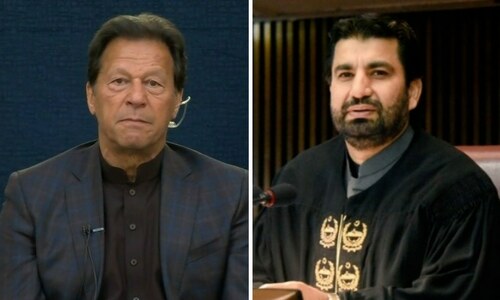ISLAMABAD: Over 100 prominent academics and civil society leaders have written an open letter to Chief Justice of Pakistan Justice Umar Ata Bandial in which they said no compromise should be made in determining the legality of the decision taken by the National Assembly’s deputy speaker to reject the no-confidence motion against the prime minister.
The letter terms the outgoing government’s actions a major threat to social cohesion and the nation’s well-being. It says responsibility should be fixed and exemplary punishment ensured to deter further excesses. All political parties must be directed to avoid hate-mongering through unsubstantiated allegations and assertions.
The writers called for the formation of a judicial commission, comprising serving judges of the Supreme Court, to determine authenticity of the claims made by interim prime minister Imran Khan that a foreign conspiracy was behind the no-trust motion against him.
“Due process cannot be suspended and the fundamental right of parliamentarians to vote cannot be violated on the basis of unsubstantiated allegations.”
The signatories include prominent educationists, vice chancellors, journalists and human rights activists.
Among them are human rights activists Haris Khaleeq, Karamat Ali, Khawar Mumtaz and Dr Ammar Ali Jan, Advocate Salman Akram Raja, former secial assistant to prime minister on health Dr Zafar Mirza, chairperson of the Higher Education Commission Dr Tariq Banuri, journalists Najam Sethi, Aamir Ghouri and Mohsin Baig, writers and political analysts Dr Ishtiaq Ahmad, Salima Hashmi, Dr Ayesha Razzaque and retired general Talat Masood.
The signatories laid stress on the primacy of the Constitution as a sacred covenant between all sections of society and the ultimate expression of the collective will of the nation.
An unconditional and strict adherence to the Constitution is the only way to establish and sustain a peaceful, civilised and prosperous society and to avoid lawlessness and anarchy.
The letter contended that the verdict to be delivered by the Supreme Court concerning the Constitution would shape the nation’s destiny for a long time to come.
“The honour and well-being of our future generations lie only in adherence to the Constitution and inclusive politics epitomising mutual acceptance of mandates, a level-playing field and observance of the basic norms of decency,” the writers observed.
The signatories said they were hopeful that the judiciary’s unwavering commitment to constitutionalism and unbounded passion for justice would steer the nation through these troubled times.
They suggested that the due process prescribed in the Constitution must be followed in letter and spirit and no compromise be made under any pretext to justify unlawful and unconstitutional actions.
“Responsibility should be fixed in case subversion of the Constitution is established during the proceedings and an exemplary retribution ensured to dissuade transgressions in future.”
The letter writers appealed to the apex court to direct all institutions to act within the “prescribed constitutional boundaries”.
The political process must be allowed to go on unhindered and take its own course within the confines of the Constitution.
Published in Dawn, April 7th, 2022













































